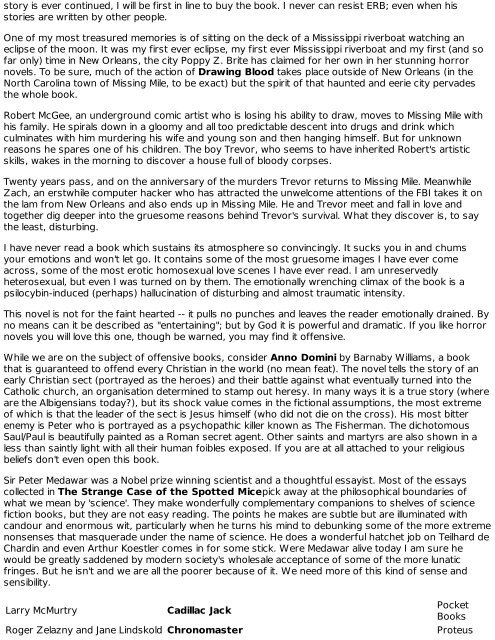Triffids Beard 2 - The Bearded Triffid
Triffids Beard 2 - The Bearded Triffid
Triffids Beard 2 - The Bearded Triffid
You also want an ePaper? Increase the reach of your titles
YUMPU automatically turns print PDFs into web optimized ePapers that Google loves.
story is ever continued, I will be first in line to buy the book. I never can resist ERB; even when his<br />
stories are written by other people.<br />
One of my most treasured memories is of sitting on the deck of a Mississippi riverboat watching an<br />
eclipse of the moon. It was my first ever eclipse, my first ever Mississippi riverboat and my first (and so<br />
far only) time in New Orleans, the city Poppy Z. Brite has claimed for her own in her stunning horror<br />
novels. To be sure, much of the action of Drawing Blood takes place outside of New Orleans (in the<br />
North Carolina town of Missing Mile, to be exact) but the spirit of that haunted and eerie city pervades<br />
the whole book.<br />
Robert McGee, an underground comic artist who is losing his ability to draw, moves to Missing Mile with<br />
his family. He spirals down in a gloomy and all too predictable descent into drugs and drink which<br />
culminates with him murdering his wife and young son and then hanging himself. But for unknown<br />
reasons he spares one of his children. <strong>The</strong> boy Trevor, who seems to have inherited Robert's artistic<br />
skills, wakes in the morning to discover a house full of bloody corpses.<br />
Twenty years pass, and on the anniversary of the murders Trevor returns to Missing Mile. Meanwhile<br />
Zach, an erstwhile computer hacker who has attracted the unwelcome attentions of the FBI takes it on<br />
the lam from New Orleans and also ends up in Missing Mile. He and Trevor meet and fall in love and<br />
together dig deeper into the gruesome reasons behind Trevor's survival. What they discover is, to say<br />
the least, disturbing.<br />
I have never read a book which sustains its atmosphere so convincingly. It sucks you in and chums<br />
your emotions and won't let go. It contains some of the most gruesome images I have ever come<br />
across, some of the most erotic homosexual love scenes I have ever read. I am unreservedly<br />
heterosexual, but even I was turned on by them. <strong>The</strong> emotionally wrenching climax of the book is a<br />
psilocybin-induced (perhaps) hallucination of disturbing and almost traumatic intensity.<br />
This novel is not for the faint hearted -- it pulls no punches and leaves the reader emotionally drained. By<br />
no means can it be described as "entertaining"; but by God it is powerful and dramatic. If you like horror<br />
novels you will love this one, though be warned, you may find it offensive.<br />
While we are on the subject of offensive books, consider Anno Domini by Barnaby Williams, a book<br />
that is guaranteed to offend every Christian in the world (no mean feat). <strong>The</strong> novel tells the story of an<br />
early Christian sect (portrayed as the heroes) and their battle against what eventually turned into the<br />
Catholic church, an organisation determined to stamp out heresy. In many ways it is a true story (where<br />
are the Albigensians today?), but its shock value comes in the fictional assumptions, the most extreme<br />
of which is that the leader of the sect is Jesus himself (who did not die on the cross). His most bitter<br />
enemy is Peter who is portrayed as a psychopathic killer known as <strong>The</strong> Fisherman. <strong>The</strong> dichotomous<br />
Saul/Paul is beautifully painted as a Roman secret agent. Other saints and martyrs are also shown in a<br />
less than saintly light with all their human foibles exposed. If you are at all attached to your religious<br />
beliefs don't even open this book.<br />
Sir Peter Medawar was a Nobel prize winning scientist and a thoughtful essayist. Most of the essays<br />
collected in <strong>The</strong> Strange Case of the Spotted Micepick away at the philosophical boundaries of<br />
what we mean by 'science'. <strong>The</strong>y make wonderfully complementary companions to shelves of science<br />
fiction books, but they are not easy reading. <strong>The</strong> points he makes are subtle but are illuminated with<br />
candour and enormous wit, particularly when he turns his mind to debunking some of the more extreme<br />
nonsenses that masquerade under the name of science. He does a wonderful hatchet job on Teilhard de<br />
Chardin and even Arthur Koestler comes in for some stick. Were Medawar alive today I am sure he<br />
would be greatly saddened by modern society's wholesale acceptance of some of the more lunatic<br />
fringes. But he isn't and we are all the poorer because of it. We need more of this kind of sense and<br />
sensibility.<br />
Larry McMurtry Cadillac Jack<br />
Pocket<br />
Books<br />
Roger Zelazny and Jane Lindskold Chronomaster Proteus


